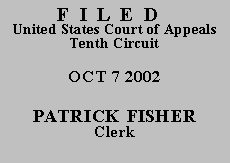

| UNITED STATES OF AMERICA,
Plaintiff - Appellee, |
|
| v. | |
| JUAN VARGAS-HERRERA,
Defendant - Appellant. |
Defendant Juan Vargas-Herrera appeals his sentence imposed after he pled guilty to one count of transporting illegal aliens resulting in serious bodily injury (8 U.S.C. § 1324(a)(1)(A)(ii) and (a)(1)(B)(iii)). He contends the district court erred in enhancing his sentence pursuant to U.S.S.G. § 2L1.1(b)(5). Because we conclude the district court properly applied the sentencing guidelines, we affirm.
In April 2001, Vargas-Herrera was driving a minivan containing thirteen illegal aliens, in addition to himself, along an isolated stretch of Interstate 70 in Colorado. Vargas-Herrera lost control of the minivan, causing it to roll over. Several passengers were injured, including one who sustained a serious head injury and another who was paralyzed. At the time of the accident, the passengers were sitting or lying on the floor of the minivan because its rear seats and seatbelts had been removed. The rated maximum passenger occupancy of the minivan was seven. In March 2002, Vargas-Herrera pled guilty to one count of transporting illegal aliens resulting in serious bodily injury. At sentencing, the district court enhanced his sentence in accordance with U.S.S.G. § 2L1.1(b)(5), and sentenced him to thirty-seven months' imprisonment.
We review for clear error the district court's factual findings regarding sentencing and review de novo its legal interpretation of the Sentencing Guidelines. United States v. Maldonado-Acosta, 210 F.3d 1182, 1183 (10th Cir. 2000). Here, the district court enhanced Vargas-Herrera's sentence pursuant to § 2L1.1(b)(5) based on the lack of rear seats and seatbelts in the minivan and the dangerous conditions created by exceeding the maximum rated passenger capacity. Under § 2L1.1(b)(5), a defendant's offense level is increased "[i]f the offense involved intentionally or recklessly creating a substantial risk of death or serious bodily injury to another person."
Vargas-Herrera does not dispute the district court's factual findings, but argues that the evidence did not support an enhancement under § 2L1.1(b)(5). This argument, however, is meritless. The commentary to § 2L1.1 states that the "[r]eckless conduct to which the adjustment from subsection (b)(5) applies includes a wide variety of conduct," including, "carrying substantially more passengers than the rated capacity of a motor vehicle or vessel, or harboring persons in a crowded, dangerous, or inhumane condition." U.S.S.G. § 2L1.1, cmt. n.6 (2001). Here, it is undisputed that Vargas-Herrera was driving a vehicle with substantially more passengers than the rated capacity of the vehicle, and that the vehicle's rear seats and seatbelts had been removed. Based on this evidence, the court did not err in enhancing his sentence pursuant to § 2L1.1(b)(5). See United States v. Ramirez-Martinez, 273 F.3d 903, 916 (9th Cir. 2001); United States v. Rio-Baena, 247 F.3d 722, 723 (8th Cir. 2001); see also United States v. Jose-Gonzalez, 291 F.3d 697, 699-700, 708 (10th Cir. 2002) (affirming sentence enhancement under similar conditions without questioning the district court's application of § 2L1.1(b)(5)).
We AFFIRM Vargas-Herrera's sentence.
Entered for the Court
Mary Beck Briscoe
Circuit Judge
*.This order and judgment is not binding precedent, except under the doctrines of law of the case, res judicata, and collateral estoppel. The court generally disfavors the citation of orders and judgments; nevertheless, an order and judgment may be cited under the terms and conditions of 10th Cir. R. 36.3.